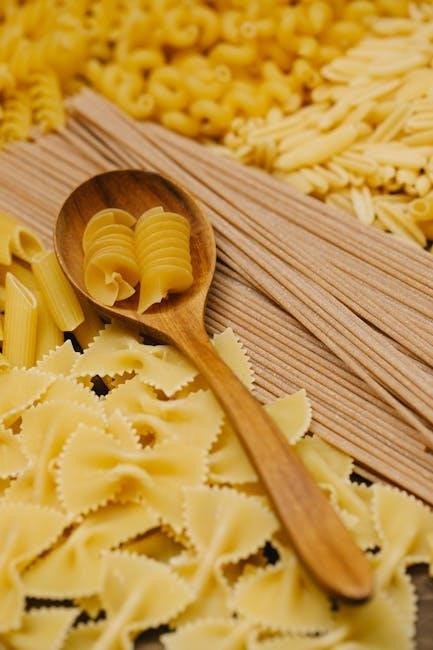The Blood Type O Diet, developed by Dr. Peter D’Adamo, focuses on high-protein foods like lean meats, fish, and vegetables, avoiding dairy and grains for optimal health benefits.
Overview of the Blood Type Diet Concept
The Blood Type Diet, developed by Dr. Peter D’Adamo, suggests tailoring your diet to your blood type for optimal health. It proposes that blood type influences how your body processes food, with certain foods being beneficial or harmful based on this factor. For Blood Type O, the focus is on high-protein, lean meats, fish, and vegetables, while avoiding grains, legumes, and dairy. This approach aims to enhance digestion, energy, and overall well-being by aligning diet with genetic makeup.
Importance of Tailoring Diet to Blood Type
Tailoring your diet to your blood type, as outlined by Dr. Peter D’Adamo, is crucial for optimizing health and preventing chronic conditions. Blood type determines how your body reacts to specific foods, with lectins in certain foods potentially causing inflammation or digestive issues. By aligning your diet with your blood type, you can enhance nutrient absorption, boost energy, and reduce the risk of health disorders, making it a personalized approach to nutrition for overall well-being.
Dr. Peter D’Adamo and His Research
Dr. Peter D’Adamo, a naturopathic physician, pioneered the Blood Type Diet through his research, outlining how blood type influences digestion and health. His book, Eat Right 4 Your Type, introduced the concept of lectins in foods reacting with blood types, causing inflammation or digestive issues. D’Adamo’s work emphasizes personalized nutrition, linking blood type to optimal food choices for improved well-being and disease prevention, making it a cornerstone of tailored dietary approaches worldwide.

Understanding Blood Type O
Blood Type O is the universal donor, known for its strong immune system and ability to thrive on high-protein diets rich in meats and vegetables, avoiding grains and legumes for optimal health and digestion.
Characteristics of Blood Type O
Blood Type O individuals are known for their robust immune systems and strong digestive capabilities. They typically thrive on diets high in protein, such as lean meats, fish, and vegetables. People with Type O blood often have higher stomach acid levels, which aids in breaking down meat efficiently. They are generally more tolerant of stress and have a lower risk of certain diseases. Dr. D’Adamo suggests that Type O individuals benefit from avoiding grains, legumes, and dairy to maintain optimal health and energy levels.
Historical and Evolutionary Context
Blood Type O is considered the oldest blood type, evolving from hunter-gatherer diets rich in meats and minimal in carbohydrates. Dr. D’Adamo suggests that Type O individuals are genetically programmed to thrive on high-protein diets, mirroring the dietary habits of early humans. This blood type is associated with a strong digestive system, designed to break down meat efficiently. Historically, Type O individuals were the original “carnivores,” making them well-suited to diets low in grains and dairy, which were introduced later in human evolution.
Metabolic and Digestive Traits
Individuals with Blood Type O typically have a strong digestive system with high stomach acid, making them well-suited for digesting meat. They metabolize fat efficiently but may struggle with carbohydrate metabolism. A diet rich in protein and low in carbohydrates helps maintain weight and energy levels. Avoiding inflammatory foods like grains and legumes is crucial, as they can hinder digestion and lead to weight gain. Proper food choices support optimal metabolic function and reduce inflammation risks. Adherence to the diet enhances overall health and vitality.

Recommended Foods for Blood Type O
Focus on lean meats, fish, and vegetables, which are easily digested. Include beneficial fruits and avoid inflammatory foods like grains and legumes for optimal health benefits.
Highly Beneficial Meats and Poultry
For Blood Type O, highly beneficial meats include lean options like beef, buffalo, lamb, and venison. Organ meats such as liver are also advantageous. These high-protein foods promote efficient digestion and weight management. Poultry like chicken should be consumed in moderation, while avoiding processed meats. Ensuring these meats are grass-fed or organic enhances their nutritional value, aligning with the diet’s focus on natural, chemical-free choices to support overall health and energy levels.
Beneficial Seafoods
Fatty fish like cod, salmon, and mackerel are highly beneficial for Blood Type O individuals. These seafoods are rich in omega-3 fatty acids, which support heart health and reduce inflammation. Other recommended options include halibut, grouper, and snapper. Seafoods like tilapia and catfish can be consumed in moderation. Avoiding shellfish and high-mercury fish is advised to minimize potential health risks. These choices align with the diet’s emphasis on lean, protein-rich foods to optimize digestion and energy levels.
Recommended Eggs and Dairy
Eggs are highly beneficial for Blood Type O individuals, especially when consumed in moderation; Choose organic, free-range options for better nutritional value. Dairy products should be limited, but goat’s milk and feta cheese are tolerable in small amounts. Avoid cow’s milk and high-lactose products, as they can cause digestive issues. Opting for non-dairy alternatives like almond or coconut milk is also a healthier choice. These selections support the diet’s focus on reducing inflammation and enhancing metabolic efficiency.
Healthy Oils and Fats
For Blood Type O, olive oil, flaxseed oil, and coconut oil are highly beneficial, supporting digestion and reducing inflammation. Avocado oil is also a good choice. These oils provide essential fatty acids and promote overall health. Avoid processed and hydrogenated fats, as they can hinder metabolic efficiency. Incorporating these healthy oils enhances the diet’s effectiveness, aligning with its focus on improving digestion and reducing inflammation. They are versatile additions to meals, ensuring optimal nutritional balance.
Nuts and Seeds
For Blood Type O, pumpkin seeds and sunflower seeds are highly beneficial, offering rich sources of magnesium and zinc. Flaxseeds and walnuts are also recommended for their omega-3 fatty acids. However, peanuts, sesame seeds, and cashews should be avoided as they can cause inflammation. Nuts and seeds provide essential nutrients and support overall health when chosen appropriately. Incorporating these into meals enhances the diet’s effectiveness, promoting better digestion and energy levels while avoiding potential allergens and irritants.

Recommended Cereals and Grains
For Blood Type O, oats and barley are highly beneficial grains due to their ease of digestion and nutrient-rich profile. Other recommended options include quinoa and rice, which provide sustained energy and fiber. However, wheat, corn, buckwheat, and rye should be avoided as they can trigger inflammation and digestive issues. Incorporating the right cereals and grains supports optimal health, while avoiding problematic ones helps maintain blood type harmony and reduces the risk of adverse reactions. Moderation is key to balancing this aspect of the diet;
Beneficial Vegetables
Spinach, broccoli, kale, and carrots are highly beneficial for Blood Type O individuals. These vegetables are rich in essential nutrients and antioxidants, supporting immune function and digestion. They are easy to digest and provide necessary vitamins and minerals without causing inflammation. Incorporating these vegetables into your diet helps maintain optimal health and energy levels, aligning with the dietary goals for Blood Type O. They are versatile and can be prepared in various ways to enhance meals while adhering to the blood type diet guidelines.
Recommended Fruits
For Blood Type O, beneficial fruits include berries, cherries, and plums, which are rich in antioxidants and easy to digest. These fruits support immune function and energy levels. Avoiding citrus fruits and tropical options like mangoes and papayas is advised, as they can cause digestive discomfort. Incorporating these recommended fruits into your diet promotes overall health and aligns with the Blood Type O dietary guidelines, ensuring proper nutrient absorption and balanced digestion.

Foods to Avoid for Blood Type O
Individuals with Blood Type O should avoid corn, wheat, buckwheat, lentils, tomatoes, peanuts, and sesame seeds, as these can cause inflammation and digestive discomfort.
Foods That Can Cause Inflammation
For Blood Type O individuals, foods like corn, wheat, buckwheat, lentils, tomatoes, peanuts, and sesame seeds can trigger inflammation due to lectins, which may cause an immune response. These foods can lead to digestive discomfort, bloating, and fatigue. Avoiding them is crucial to prevent chronic inflammation and maintain optimal health.
Grains to Avoid
Individuals with Blood Type O should avoid certain grains, including wheat, corn, and buckwheat, as they contain lectins that may cause digestive issues and inflammation. These grains can interfere with proper nutrient absorption and may lead to bloating or discomfort. Eliminating them helps optimize digestion and overall health, aligning with the diet’s focus on reducing inflammatory responses and promoting well-being.

Legumes to Minimize
Legumes such as lentils, peanuts, and sesame seeds are problematic for Blood Type O individuals. These foods contain lectins that can cause inflammation and digestive discomfort. Minimizing or avoiding them helps reduce potential health issues, promoting better nutrient absorption and overall well-being. This aligns with the Blood Type O Diet’s focus on eliminating inflammatory triggers and optimizing digestive health for improved energy and vitality.
Problematic Vegetables
Certain vegetables, such as corn, tomatoes, and potatoes, are problematic for Blood Type O individuals. These foods contain lectins that can cause inflammation and digestive issues. Avoiding them helps reduce these risks, supporting better digestion and energy levels. This aligns with the Blood Type O Diet’s emphasis on eliminating inflammatory triggers and promoting optimal health through tailored nutrition.
Fruits to Limit
Certain fruits, such as strawberries, kiwis, and mangoes, should be limited for Blood Type O individuals. These fruits contain lectins that can cause inflammation and digestive discomfort. While they may be nutritious, they can interfere with the diet’s goals of reducing inflammation and improving digestion. It’s best to focus on fruits like berries, apples, and bananas, which are more compatible with Blood Type O and support overall well-being.
Dairy Products to Avoid
For Blood Type O individuals, certain dairy products should be avoided to prevent inflammation and digestive issues. Milk, cheese, ice cream, and butter contain lectins that can interfere with optimal health. These foods may cause sluggish digestion and increase inflammation, which can hinder weight management and energy levels. It is recommended to opt for non-dairy alternatives like almond milk or coconut milk to support better overall well-being and adherence to the diet.

Benefits of the Blood Type O Diet
The Blood Type O Diet promotes weight management, improved digestion, and enhanced energy levels by focusing on high-protein foods and avoiding inflammatory triggers.
Weight Management
The Blood Type O Diet is highly effective for weight management, focusing on high-protein foods like lean meats, fish, and vegetables. By avoiding dairy and grains, individuals often experience faster weight loss and improved fat metabolism. The diet’s emphasis on nutrient-dense foods helps maintain muscle mass while shedding pounds. Dr. D’Adamo suggests that this approach mimics the dietary habits of early hunter-gatherers, optimizing weight loss and overall health. Proper hydration and portion control further support sustainable weight management.
Improved Digestion
The Blood Type O Diet promotes improved digestion by eliminating foods that cause inflammation and discomfort. Avoiding corn, wheat, buckwheat, lentils, tomatoes, peanuts, and sesame seeds reduces digestive stress. The diet emphasizes lean meats, fish, and vegetables, which are easier to digest for Type O individuals. This tailored approach minimizes bloating and digestive discomfort, fostering a healthier gut and better nutrient absorption. By aligning food choices with genetic traits, the diet supports optimal digestive function and overall well-being.
Enhanced Energy Levels
The Blood Type O Diet helps boost energy by focusing on foods that align with the body’s natural chemistry. High-protein foods like lean meats and fish provide sustained energy, while avoiding inflammatory foods reduces fatigue. The diet’s emphasis on beneficial vegetables and fruits supports metabolic efficiency, preventing energy crashes. By tailoring nutrition to blood type, individuals often experience increased vitality and mental clarity, making it easier to maintain an active and productive lifestyle without energy dips.
Reduced Inflammation
The Blood Type O Diet helps reduce inflammation by eliminating foods that trigger immune responses, such as corn, wheat, and tomatoes. By focusing on lean proteins, beneficial vegetables, and fruits, the diet minimizes lectin-related inflammation. Avoiding dairy and problematic grains further supports anti-inflammatory benefits. This tailored approach promotes healthier digestion and immune function, leading to reduced inflammation and improved overall well-being for individuals with blood type O.

Challenges and Considerations
The Blood Type O Diet requires careful meal planning and grocery shopping to avoid inflammatory foods like corn, wheat, and tomatoes, which are common in many diets.
Common Mistakes to Avoid
Avoiding chicken, corn, wheat, and tomatoes is crucial for Blood Type O individuals. Overconsumption of dairy and legumes can hinder digestion and cause inflammation, leading to weight gain and fatigue. Ignoring the recommended food list may result in reduced energy levels and increased health risks. Sticking strictly to lean meats, fish, and beneficial vegetables ensures optimal results and prevents common pitfalls of the diet.
Addressing Nutritional Deficiencies
Blood Type O individuals may face deficiencies in certain nutrients due to dietary restrictions. Ensuring adequate intake of beneficial foods like lean meats, fish, and vegetables is essential. Incorporating nutrient-dense options such as leafy greens, nuts, and seeds can help maintain balance. Supplements tailored for Blood Type O, such as polyvite O, may be recommended to address specific needs. Consulting a healthcare provider or dietitian can help prevent potential deficiencies and optimize overall nutrition.
Practical Tips for Adherence
Adhering to the Blood Type O Diet requires careful planning. Start by creating a weekly meal plan and grocery list focused on approved foods. Avoid forbidden foods like corn, wheat, and lentils. Incorporate lean meats, fish, and vegetables into meals. Practice portion control and track intake to ensure balance. Stay hydrated and consider physical activity to support overall health. Tailor supplements, such as polyvite O, to address specific nutritional needs. Consistency is key to achieving long-term benefits;

Meal Planning and Grocery Shopping
Plan weekly meals using the Blood Type O food list PDF for guidance. Shop for lean meats, fish, vegetables, and beneficial grains to ensure dietary adherence and variety.
Sample Meal Ideas
Start your day with scrambled eggs, spinach, and olive oil. For lunch, enjoy grilled chicken or fish with steamed broccoli and a side of quinoa. Dinner could feature lean beef stir-fried with kale and garlic, served over rice. Incorporate beneficial fruits like berries or cherries for snacks. These meals align with the Blood Type O diet, promoting energy and digestive health while avoiding inflammatory foods.
Creating a Weekly Meal Plan
Plan meals around lean proteins like beef, chicken, or fish, paired with vegetables such as spinach, broccoli, and kale. Include quinoa or rice for grains. Breakfast options might feature eggs with greens, while snacks include berries or cherries. Rotate protein sources daily to maintain variety, such as grilled lamb or cod. Ensure hydration with water and herbal teas. Adjust portion sizes based on activity levels and goals. This structured approach helps maintain consistency and optimizes benefits for Blood Type O individuals;
Essential Items for Your Pantry
Stock your pantry with high-protein staples like beef, lamb, and wild-caught fish. Incorporate beneficial grains such as quinoa and rice. Include healthy oils like olive oil and flaxseed oil. Add nuts and seeds like walnuts and pumpkin seeds. Store fresh vegetables such as spinach and kale, and fruits like berries and cherries. Keep a supply of herbal teas and filtered water for hydration. These essentials support the Blood Type O diet by providing balanced and nutritious meal options.

Lifestyle and Supplement Tips
The Blood Type O Diet emphasizes a high-protein lifestyle, regular exercise, and proper hydration. Supplements like Polyvite O, designed by Dr. D’Adamo, support metabolic health and energy.
Exercise Recommendations
For Blood Type O individuals, regular physical activity is crucial. Dr. D’Adamo recommends high-intensity workouts like running, swimming, or strength training to boost energy and mental clarity. These exercises help manage stress and align with the diet’s focus on lean proteins and minimal carbohydrates. Consistency is key to maintaining metabolic balance and overall well-being. Activities that promote relaxation, such as yoga or meditation, are also encouraged to complement the high-protein lifestyle and support immune function.
Hydration and Stress Management
Staying hydrated is essential for Blood Type O individuals, with water and herbal teas being ideal choices. Managing stress through mindfulness, deep breathing, or meditation helps maintain balance. Chronic stress can hinder digestion and energy levels, so incorporating relaxation techniques is crucial. Regular hydration supports optimal digestion and nutrient absorption, while stress management enhances overall well-being and complements the dietary regimen tailored for Blood Type O individuals.
Supplements for Blood Type O
Supplements tailored for Blood Type O can enhance overall health. Polyvite O, designed by Dr. D’Adamo, addresses specific nutritional needs. Probiotics support gut health, crucial for digestion. Multivitamins help fill dietary gaps.
Adopting the Blood Type O Diet can lead to improved health and energy. Start by incorporating recommended foods and avoiding harmful ones. Consult resources for guidance.
Final Thoughts on the Blood Type O Diet
The Blood Type O Diet, rooted in Dr. Peter D’Adamo’s research, emphasizes high-protein, low-carb eating to optimize health. By focusing on lean meats, fish, and vegetables while avoiding inflammatory foods like grains and dairy, individuals with type O blood can experience benefits such as improved digestion, weight management, and increased energy. While results vary, adhering to this diet can promote long-term well-being. For best outcomes, pair dietary changes with lifestyle adjustments and consult a healthcare provider;
Resources for Further Learning
For deeper insights, explore Dr. Peter D’Adamo’s book, Eat Right 4 Your Type, which details the Blood Type O Diet. Official websites offer downloadable PDF guides, food lists, and meal plans. Additionally, reliable platforms provide comprehensive food charts and shopping tips tailored to blood type O. These resources help individuals implement and maintain the diet effectively, ensuring they make informed choices for optimal health and wellness.
Encouragement to Start the Journey
Embrace the Blood Type O Diet with confidence! By following the tailored food list and lifestyle tips, you can achieve improved health and vitality. Start small, incorporate beneficial foods, and gradually reduce avoidable items. Utilize the downloadable PDF guides and meal plans for easy reference. Remember, consistency is key, and the rewards of enhanced digestion, energy, and weight management will motivate you to continue. Celebrate each step forward and enjoy the journey to a healthier you!